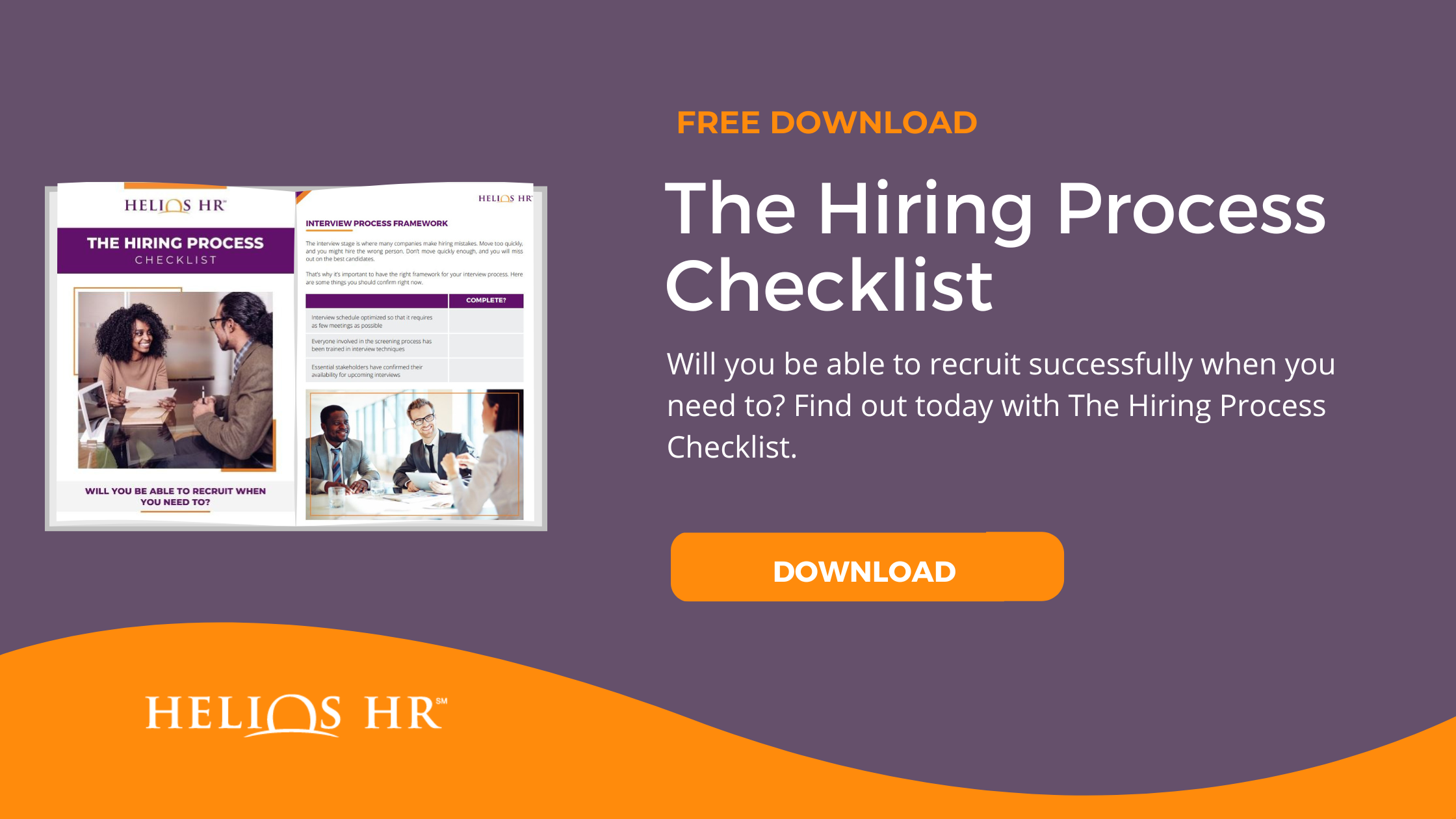By: Debra Kabalkin on January 10th, 2023
What is RPO (Recruitment Process Outsourcing)?
The recruitment market is more daunting than ever right now. Around 80% of hiring managers say that they can’t find skilled applicants, which means that there’s an intense feeding frenzy whenever a new candidate starts applying for jobs. Small wonder then that so many companies are turning to RPO, or Recruitment Processing Outsourcing.
RPO is a form of Business Process Outsourcing that focuses on recruitment. Your Recruitment Process Outsourcing consultant works with your talent acquisition team to help you manage your hiring requirements.
Let’s take a look at how this approach can make candidate sourcing easier. But first, let’s talk about the difference between Recruitment Process Outsourcing and working with a traditional recruitment agency.
What’s the difference between RPO and a recruitment agency?
When you work with an old-fashioned recruitment agency, they’ll listen to your requirements and then get back to you with a stack of resumes. They may perform some candidate screening, but everything else in the process is up to you.
There’s one big problem with this approach: your internal recruitment Team still has to do all of the hard work.
Recruiting is a fine art, especially in a tight hiring market. HR professionals may not have the know-how that allows you to compete with rival employers.
The alternative approach is Recruitment Process Outsourcing. In RPO, a recruitment consultant works with your HR department right from the beginning of the hiring cycle. They’ll help execute each step of your entire recruitment strategy while also helping you to refine your approach.
To summarize:
- Recruiting agencies connect you with candidates
- RPO service providers help execute your recruitment process
If your team doesn’t have recruitment expertise, or if they need extra support, RPO is generally the fastest way to fill a vacancy.
What happens when you work with a Recruitment Process Outsourcing consultant?
RPO consultants always start off by getting to know your human resources team. They will learn about your business, your culture, and the specific requirements of each open position. This is also a chance for your HR professionals to learn more about recruitment best practices from an expert.
What happens next depends on your agreement with an RPO provider:
- If you need a limited number of hires: Your consultant will begin by focusing on the requirements for each vacancy and building job descriptions.
- If you need ongoing support: The RPO consultant will review your hiring process and recommend ways to improve.
Once you’re up and running, an RPO consultant will get to work on expanding your team. The consultant will take you through the following steps:
1. Build out job descriptions
Perfecting the job description is the first step towards sourcing great candidates. In some cases, this may involve elements of job design, as your new RPO team helps map out a realistic set of responsibilities for each job role.
Having a great job description will make it easier to attract candidates. More importantly, it ensures that your recruitment process runs smoothly. When all stakeholders have signed off on the job description, it’s easier for hiring managers to make rapid decisions about candidate suitability.
2. Submit initial round of candidates
RPO consultants have a whole toolbox of techniques for finding great people. They’ll use their connections to reach out to passive candidates – those who are interested in opportunities but not actively job-seeking. Today’s RPOs also know how to search for remote candidates from other cities, or even from other countries.
Only around 48% of new hires come from advertisements, such as career sites and job board listings. The rest come from diverse channels, such as referrals, staffing agencies, and targeted recruitment campaigns. An RPO consultant knows how to dip into all of these talent pools.
3. Fine-tune the job description and requirements
When you review the first round of candidates, you will most likely need to review your job description, including the requirements for skills and background. Common changes at this stage include:
- Lowering the minimum candidate experience needed
- Changing requirements for education or certification
- Adding additional skills, such as soft skills or IT know-how
- Recalibrating the list of job duties
- Defining which attributes are must-have and which are nice-to-have
This fine-tuning is a normal part of the process. Each time you finesse your job description, you get closer to finding the right person.
4. Review the final list of candidates
Now that the RPO consultant has a firm idea of who you need, they can start assembling a list of resumes. This longlist of candidates will only include the best talent—people who meet your must-have requirements.
At this point, it’s up to your hiring manager (or the relevant stakeholder) to make a decision. They’ll work with the RPO to turn the candidate longlist into a shortlist. Once you’ve whittled things down, it’s time to start contacting people.
5. Conduct initial screening
The next step is to contact the candidates and screen out anyone who is unsuitable. Screening generally begins with a short phone interview, which your RPO provider can conduct. This chat will establish some basic facts, like their salary range and whether they’re interested in the role.
RPO consultants can also help with other forms of screening, such as aptitude tests. They’ll work with your team to develop a consistent screening methodology, so that each candidate is judged on an even playing field.
6. Interview and assessment
Employers often miss out on great candidates because their hiring process takes too long. Your RPO consultant can offer guidance on building an effective interview process. They’ll talk you through things like:
- How many interviews to schedule
- What to ask in each interview
- How to collate and share interview feedback with the hiring team
- How to demonstrate your culture and make a positive impact on candidates
- Onboarding and cultural integration
If you get this part right, you have a much greater chance of landing your dream candidate.
7. Process review
At this stage, you will have filled the open vacancy. But what happens next time you need to hire?
An RPO solution helps you work with you through your hiring process to gather metrics and identify potential improvements. The goal is to help you develop a recruitment methodology that will consistently deliver the right person at the right time.
In a RPO partnership, your consultant develops a deep understanding of your business needs. Your vision plus their expertise will help you build your dream team.
What are the other benefits of RPO solutions?
RPO providers can help with all aspects of your talent acquisition strategy. Other services to explore include:
- Project RPO: Businesses often need to perform high-volume hiring—for example, when you're staffing a new business location. Project RPO is a scalable, short-term solution that allows you to source, screen and hire candidates in record time.
- Tackling cost-per-hire: It's always worth reviewing your hiring process, even if you're not struggling to find candidates. Your RPO partner can identify efficiencies and suggest improvements that will improve your hiring process. This will reduce your average time-to-fill and—crucially—cost-per-hire.
- Employer branding: Your employer brand is an essential hiring tool. RPOs can help identify any branding issues that might be impacting your recruitment process. They can also suggest branding strategies, such as building a jobs portal and leveraging social media.
- Recruiting technology support: Tools such as Applicant Tracking Systems can improve your recruitment strategy, but only if you use these tools correctly. RPO consultants have experience in a range of ATSs and other systems, and they can help you build processes that make the most of recruiting technology.
- Workforce planning: Recruitment gets easier when you have lots of time to search for candidates. Workforce planning makes it easier to predict your long-term hiring needs, and identify possible recruitment challenges ahead. RPO providers can offer advice and guidance that will help you plan with accuracy.
- Executive hiring and retained search: For elite positions, you need to go beyond your normal hiring process. Many RPO providers (including Helios HR) also offer a retained search service that can help you find your next senior leader—or even your next CEO.
Look for an RPO provider that provides a holistic range of hiring services. The right partner will provide you with the RPO services you need for each step in your company's growth.
Can Recruitment Process Outsourcing help your talent acquisition strategy?
Helios HR has been helping companies to build their teams for over 20 years. Our consultants don’t just find candidates – they seek out people who can enrich and enhance your culture.
Ready to get started? Book a no-obligation consultation call today and find out how an RPO provider can solve your recruitment headaches






